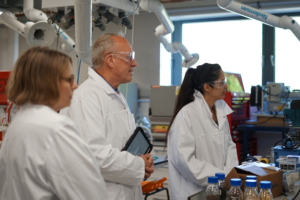Addressing existing racial inequalities in medicine
A survey conducted in 2022 by the British Medical Association found that 76% of respondents had experienced racism in the last 2 years. The Midlands Racial Equality in Medicine network (MREM) seeks to address this inequality through cross-school collaboration across the region. MREM works in partnership with MI Health (a partnership of the 7 Midlands Innovation medicine and healthcare colleges/schools) and other Midlands-based medical schools. The schools committed to MREM can be found here.
A key goal of MREM is to improve the experiences of racially minoritised students studying medicine. It seeks to do so by providing a safe space where members can share their ideas, experiences, and knowledge with peers. Through cross-school collaboration, MREM aims to: increase the visibility of role models, foster a sense of community, collaborate on research, and share best practice. It also seeks to:
- Reduce the awarding gap in medicine between white and racially minoritised students.
- Prevent incidents of racism, bullying, harassment, and microaggressions experienced by racially-minoritised students.
For more information both on the work MREM does and racism in the NHS, a documentary produced by Keele graduates Dr Alysha Harun and Dr Hashvi Shah is available to watch here.
The tangible impact of the network for its members
There are two key tangible outcomes from MREM: the ELEVATE research grant and the MREM annual conference.
- ELEVATE Research Grant: Each year, 1-2 students from racially minoritised backgrounds are funded between £500 and £1000 to further develop their research project. In addition to receiving funding for their research, grant winners are afforded the chance to present their research to an audience of over 100 people at the annual MREM conference.
- MREM Annual Conference: this offers members the opportunity to develop their professional network, to learn from keynote speakers, and to share best practice.
Both the grant and conference offer students practical, professional development opportunities. Dr Alan Harper (Keele University) notes that since winning the ELEVATE grant, Keele graduate Dr Balamrit Singh Sokhal has published several first author journal papers, marking the start of an exciting academic career.
The intangible benefits of the network for its members
MREM also provides intangible benefits for its members:
- Peer support: the Network provides a safe space for peer support for both students and staff working in medicine.
- Shared sense of purpose: the Network is home to a large group of motivated, passionate individuals who can speak on behalf of the region in response to consultations.
- Student voice: part of MREM’s governance is a committee of student representatives from each institution, who can communicate challenges and issues to appropriate members of staff on behalf of those impacted from their institution.
- Leadership skills: MREM offers students the chance to lead the organisation of MREM meetings, and to build their confidence and leadership skills.
Speaking on their experience of working with MREM as a member of staff, Dr Harper notes: “My personal experiences of working within the network has also helped me better understand racism experienced by students and I have used this to help develop staff active bystander and microaggression training for Keele University, which we are looking to roll out this year.”
MREM’s focus extends beyond the academic and professional to consider the emotional fulfilment of its members. MREM’s work is crucial to ensuring that racially minoritised students studying medicine feel supported, motivated to achieve, and that they have a community through which they can feel seen and heard.
As the network grows, MREM seeks to represent other communities that have experienced discrimination during their medical and other healthcare-related degrees – both at the university and whilst on placement in the NHS and within industry.







